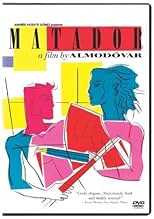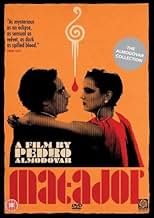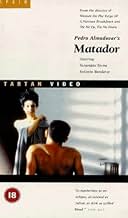A matador is wounded by a bull and can no longer kill in the arena. It is just one of the problems of one of the characters that unexpectedly collide in this film.A matador is wounded by a bull and can no longer kill in the arena. It is just one of the problems of one of the characters that unexpectedly collide in this film.A matador is wounded by a bull and can no longer kill in the arena. It is just one of the problems of one of the characters that unexpectedly collide in this film.
- Awards
- 6 wins & 6 nominations total
Nacho Martínez
- Diego
- (as Nacho Martinez)
Bibiana Fernández
- Vendedora Flores
- (as Bibi Andersen)
Verónica Forqué
- Periodista
- (as Veronica Forque)
Mercedes Jiménez
- Alumna 3ª
- (as Mercedes Jimenez)
Francesca Prandi
- Alumna 4ª
- (as Francesca Romana)
Featured review
The connection between sex and death is not a novel one. Elizabethan poetry would occasionally use the latter as a metaphor for the former. Pedro Almodóvar's sixth feature is about three people who have erased the line between the two: Nacho Martinez, a matador gored in the ring, who now teaches students on the art; Antonio Banderas, one of his pupils; and Assumpta Serna, a lawyer defending Banderas who is charged with raping and killing two girls.
In other words, it's one of Almodóvar's movies about the weird kinks of the world. This time, however, he is not concerned with the people at the edge of Spanish society, but at the center of the normal world... assuming there is such a thing. We are all weird, we all act outside the norms, and the people we respect can be the most bizarre.
It's rather slow-moving for one of his movies, probably because this is not one of his shock comedies - although there are comic elements. Visually, it is sumptuous, with a focus on colors, particularly bright reds that draw one's eyes. Miss Serna is a sharp dresser, and she wears a cape in several scenes, which she whirls like a bullfighter going in for the kill.
Is Almodóvar decrying bullfighting? Or in favor of consensual activity of whatever sort? Has he simply presented his bizarre story, and left his audience to draw the moral conclusions it chooses? Or is this simply the sort of story he likes to tell? I think the last is true, but there's nothing simple about it.
In other words, it's one of Almodóvar's movies about the weird kinks of the world. This time, however, he is not concerned with the people at the edge of Spanish society, but at the center of the normal world... assuming there is such a thing. We are all weird, we all act outside the norms, and the people we respect can be the most bizarre.
It's rather slow-moving for one of his movies, probably because this is not one of his shock comedies - although there are comic elements. Visually, it is sumptuous, with a focus on colors, particularly bright reds that draw one's eyes. Miss Serna is a sharp dresser, and she wears a cape in several scenes, which she whirls like a bullfighter going in for the kill.
Is Almodóvar decrying bullfighting? Or in favor of consensual activity of whatever sort? Has he simply presented his bizarre story, and left his audience to draw the moral conclusions it chooses? Or is this simply the sort of story he likes to tell? I think the last is true, but there's nothing simple about it.
Storyline
Did you know
- TriviaThe film that Maria and Diego stand watching at the cinema is King Vidor's Duel au soleil (1946), an equal lurid tale of wayward passion.
- Quotes
Francisco Montesinos: I've told you not to shoot up in the dressing rooms!
- ConnectionsFeatured in Playboy: The Story of X (1998)
- How long is Matador?Powered by Alexa
Details
- Release date
- Country of origin
- Official sites
- Language
- Also known as
- 鬥牛士
- Filming locations
- Viaducto de Segovia, Madrid, Spain(Bridge where Maria and Diego talk.)
- Production companies
- See more company credits at IMDbPro
Box office
- Gross US & Canada
- $279,394
- Opening weekend US & Canada
- $13,399
- Aug 13, 2006
- Gross worldwide
- $286,126
Contribute to this page
Suggest an edit or add missing content


































